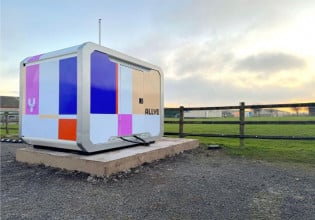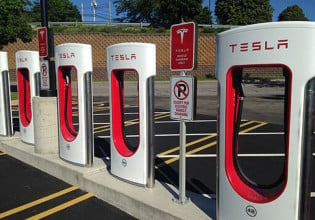GE, Nissan Sign R&D Agreement to Fast Track Broader Adoption of Electric Cars
GE and Nissan have signed a two-year research collaboration to speed up the development of a reliable, robust smart charging infrastructure to fuel mass market adoption of electric cars like the Nissan LEAF.
GE and Nissan have identified two key focus areas for the research efforts. The first relates to the integration of electric vehicles with homes and buildings. The second looks at electric vehicle charging dynamics and the future impact on the grid once millions of electric cars are on the road.
"As the U.S. and world move toward electric vehicles, the automotive sector is forming new industry connections that extend well beyond the traditional OEM space," said Mark Little, Senior Vice President and Director, GE Global Research. "One of the biggest connections being made is with companies that generate and provide electricity. As a major provider of power generation equipment and energy services, GE is in a great position to help the automotive industry bring millions of electric vehicles onto the grid."
"Connections like this research partnership with GE reinforce Nissan’s commitment to bring zero emission mobility to the mass market," said Carla Bailo, senior vice president, Research and Development, Nissan Americas. "GE’s broad expertise with energy networks will help Nissan create better conditions in the market for electric cars like Nissan LEAF, and add value for our customers both now and in the future."
Several projects around the two focus areas already are underway. In one project, researchers from the companies are studying how electric cars like Nissan LEAF can be incorporated into GE’s overall concept for a Smart Home. Nissan engineers are developing methods to connect the vehicle to the home, making it a more integrated part of the building’s energy equipment. This project will look at how the addition of an electric car impacts the cost of electricity and changes overall home electricity loads.
In another study, researchers will use aggregate usage data along with sophisticated simulation and modeling experiments, to analyze the effect millions of electric cars could have on our electrical distribution system.
For all of these projects, researchers will be seeking answers to a number of important questions. They include:
How can smart energy management systems for homes and buildings be leveraged to support the management of EV charging? How can we take advantage of energy storage and renewable power, such as home solar arrays, to reliably manage and meet the power needs of electric cars? For example, are there innovative ways to directly link charging stations with renewable power sources?
Nissan researchers are studying the use of two-way power flow between the vehicle and the home, via its CHAdeMO quick charging port, as a method to reduce the home’s consumption from the grid during peak periods, or to utilize the vehicle for emergency backup power. GE researchers have programs under way to understand how these systems, in tandem with the utility, could be used to meet vehicle charging needs without over-stressing the grid.
GE’s work will be conducted primarily at its global research operations in Niskayuna, New York, where the latest electric transportation research and smart grid technology will facilitate research programs between the two companies. Nissan Technical Center North America, located in Farmington Hills, Michigan, will lead the automaker’s efforts, including integration of vehicle-to-home charging technology, with support from the Nissan Advanced Technology Center in Japan.
More news and information regarding the latest developments in Smart Grid electronics can be found at Darnell’s SmartGridElectronics.Net.






